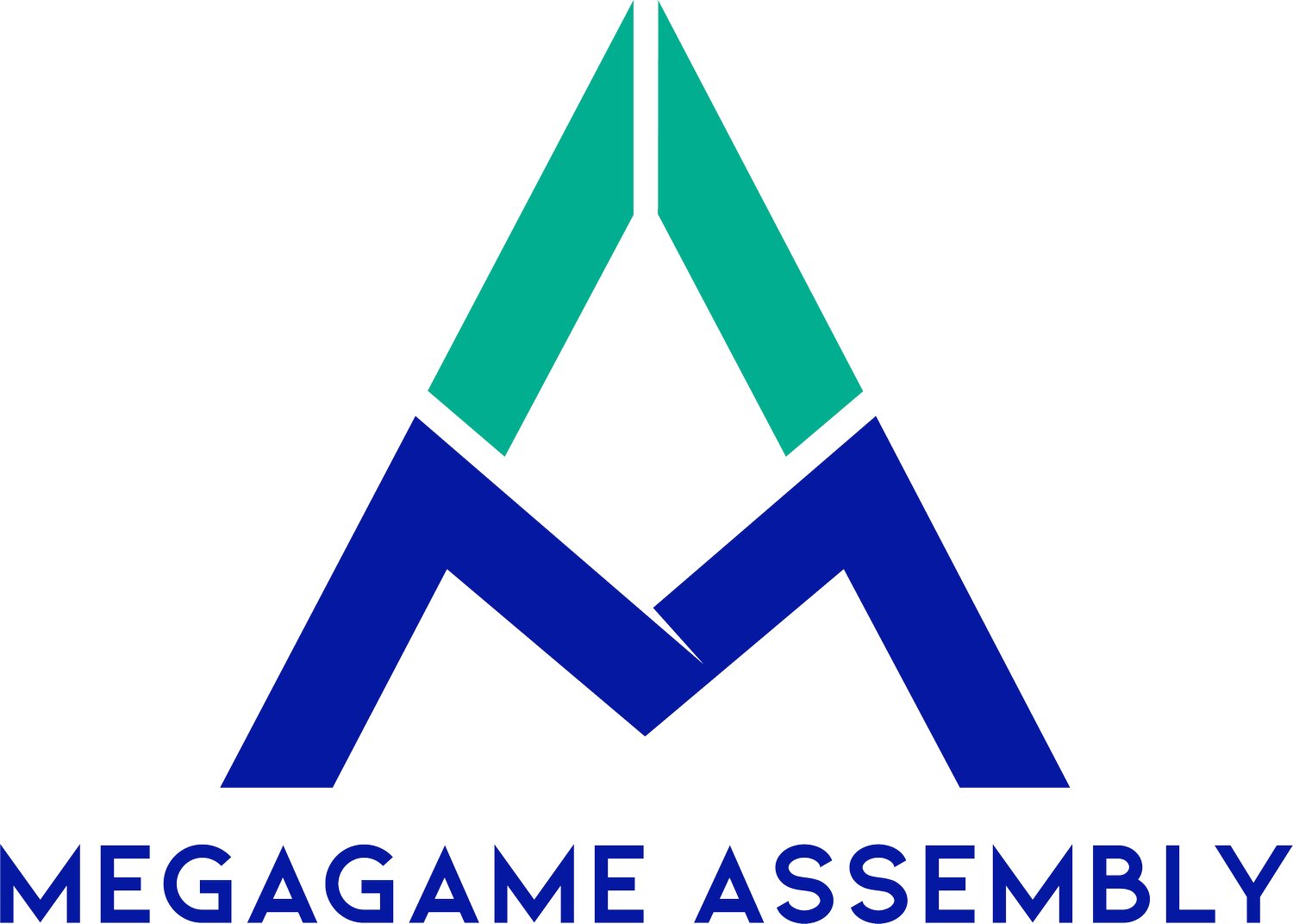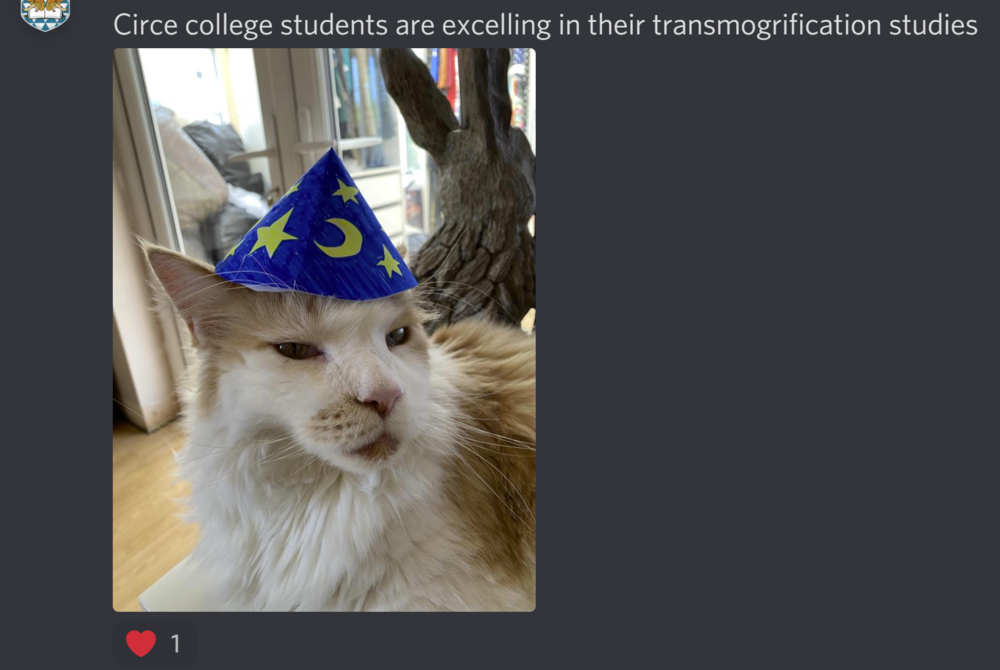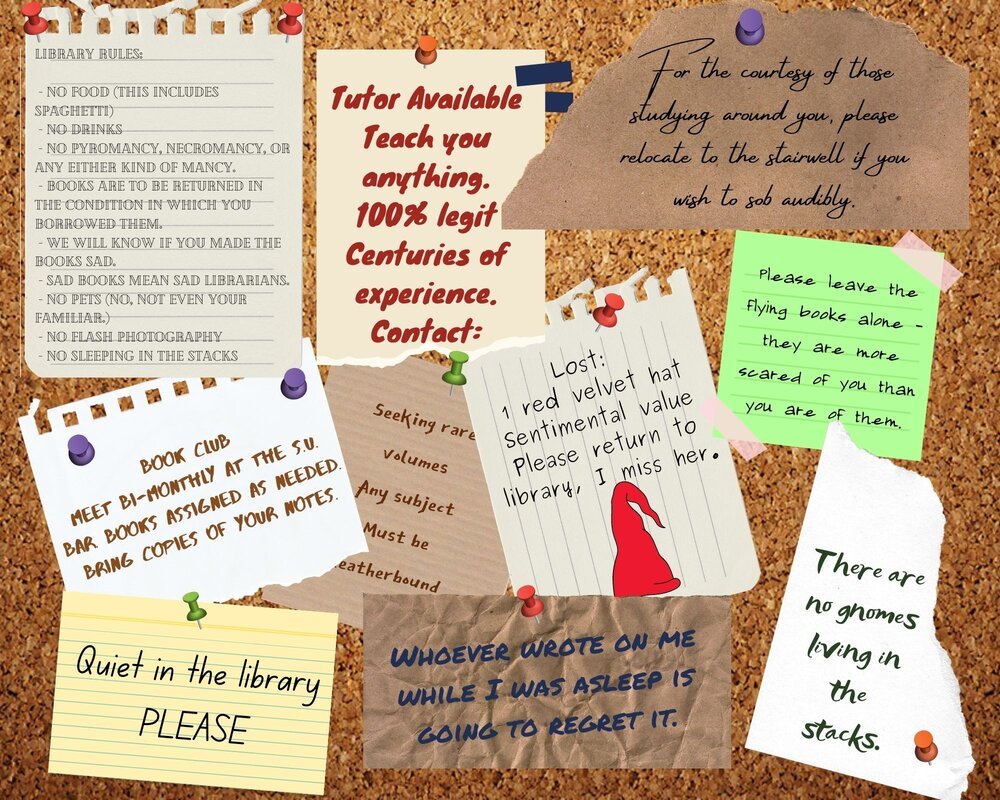Collegium – post-match analysis
Collegium’s Player Handbook front cover (Picture by: Rob Grayston)
Written by Rob Grayston, the designer for Collegium, an online megagame about running a magical university.
On Saturday 29 May I ran the first megagame I’ve written solo, on Discord, with a team of seven control and 37 players from as far away as New Zealand and Canada, though most players were based in the UK.
I’ve written this “post-match analysis” to provide some insight into how things went on the day, how they were intended to go, and potential directions for the next Collegium run. I also believe that sharing details likes these might be helpful (or at least interesting?) for the megagame community as we rarely see this kind of information once a game’s dust has settled.
Before I kick off I’d like to say thank you to True North Megagames (without the motivation of the deadline they gave me this would not have happened), the Collegium Control team, and my partner Charlotte who made things look awesome and provided additional material.
Game name: Collegium
Theme: Higher educational management in a magical university (inspiration includes Discworld, Harry Potter, real life Oxbridge, plus other sources including Warhammer (pre-End Times), Rivers of London, His Dark Materials, etc.)
Aims:
Create a fun, rich setting where players can find lots of things to develop, backstab, and plot about whilst also being immersive enough that they will want to investigate further and take ownership of both their roles and their environment. But mostly the fun bit.
Incorporate game elements I have enjoyed from previous megagames and see how they work when mixed together; in the hope of producing a game I’d want to play.
Emulate certain aspects of higher education/university management and resource allocation to see if I can gamify it in a fun manner – I’m a big fan of politics/conflict megagames, but I wanted to try something different without the usual conflicts.
Development time: Roughly equivalent to five weeks of full-time work (~187.5 hours) including content creation (written and digital assets), research, training and testing on digital tools, control briefs, design / layout / art discussion, and assorted miscellanea. Charlotte produced the visual assets over a five day period, which did involve fairly intense long days, but was also slowed considerably by limited computing power.
Structure: Teams, based on Oxbridge-style colleges, with constituent roles assigned to different minigames that would affect the overall university (e.g. Magisters who led colleges were all part of the Senate game), including some non-college based roles.
Originally intended for in-person play, but the situation required an online adaptation.
Discord shot of one of the players. How did it go so wrong so quickly? (Picture by: Rob Grayston)
What happened?:
Note: There was no driving plot or storyline for the game, just dozens of existing relationships, personal objectives, esoteric items, hooks in the background material, etc. I enjoy settings like this which have more of a ‘sandbox’ feel.
The University of Hexford battled with internal politics between rival colleges which included the age-old debate surrounding necromantic ethics and apologies for historical wrongdoing, was given a valuable lesson on the importance of Student Union bars, and was briefly invaded by thralls of the Fae. In between all of this there was some wyvern jousting, a college firing its cleaning staff and then replacing them with reanimated skeletons, a merger between two colleges, a rival Students’ Union was established, one of the colleges was fined the letter ‘r’ (which happened to be in its name, as well as the words ‘magister’, ‘bursar’, and ‘senior tutor’) for poor behaviour, and a new institute for Fae education was established.
Far more than this took place (including a wyvern-based poop-bombing run on another college, the student journalist turning into a sentient flower, and one senior wizard blasting off their own foot whilst removing a bridge from existence), but I think this covers a lot of the action.
Some of the digital elements fell apart before the first turn was over, and I don’t believe a single role-based minigame worked quite as intended or tested. However, the control team did a top job of keeping things going and I’m grateful for their efforts to manage the players’ experience and keep them engaged.
What went well:
Overall theme, background, and supporting materials. There was a lot of material for players to grab onto and explore, with some beautiful resources (college shields, setting background guide, etc.).
Player buy-in. Due to the above (and some solid control efforts), there was a lot of player immersion, which included superb player-produced resources for the game. It was great to see how into it people got! As an example, the Magisters talking about what kind of dinner to hold the night before the game was fun and very reminiscent of something from Discworld’s Unseen University, plus all the Students’ Union visual aids.
Results (the non-magic bits). From a purely simulationist perspective, this was pretty close to the mark where higher education and university-based decisions and outcomes are concerned. I don’t mean the wyverns or the fairies – but student political developments, upper management making policy without concern for realities (financial or otherwise) elsewhere, and big expensive projects with little accountability and no clear purpose all sounded familiar (whilst I’m classing this as a “win” it’s debateable how happy I am with it as I will always defend Fun > Simulation for a recreational megagame, but it does reflect achieving a design aim?)
Players interacting on Discord for the betterment of the University of Hexford (Picture by: Rob Grayston)
What needs improvement:
Player (and control) expectations and actions need to be managed more effectively.
There is absolutely zero harm in explaining things in greater depth so that payers/control have a better handle on what you’ve got prepared for the megagame, and I could have done much better here. This could be something as specific as giving guidelines on how to raise more cash from university alumni and donors, or explaining how different minigames were supposed to interact with each other.
Better reinforcement of background-based material. I am a big fan of allowing people free reign for better or worse*, but some stuff should be adhered to (at least loosely) to help inform the story and keep things on track for everyone.
Test mini-games at scale, and with strangers/neutral parties. In future I fully intend to do more rigorous testing processes for individual game elements, and with people I don’t know to help prevent confirmation bias due to the familiar playstyles of people I game with! Stress-testing and feedback provision is not something everyone can do well so I need to think about this more.
Quiet in the library PLEASE! (Picture by: Rob Grayston)
So far I have had 25 pieces of feedback (from players and control; the game had a total of 45 people on the day, a handful of which did drop out).
These numbers include four people who said they would not play Collegium again and 7 who have said they would play again, but only in-person. As a rough back-of-napkin projection where I extrapolate these numbers across all those present this could scale up to 8 who would not play again, 14 who would only play in-person, and 23-ish would play online again.
I have heard from one person who informed me that Collegium made them realise the online format could be as engaging as in-person megagames (and that their experience was going to inform their own megagame design, awesome!), and from two people who believe online megagaming is “not for them.”
I really appreciate the candour people have expressed with their feedback, and whilst it’s not great to realise that something you have spent a long time putting together hasn’t worked as well as you’d hoped, it does show what can be made better for the next run. Of course, there was plenty of positive feedback too which is always nice, but overall thank you to those who got in touch!
There were definite trends in feedback which informed commentary above on what did and did not go well, but here are some other comments which may be enlightening:
“Systems more interactive. Less reliant on wizard wheezes, or a lot more plot.”
“Stricter guidelines for big meetings - the first few Budget turns were wasted because we weren't on the ball enough. Have Control be the opening chair for a turn to set the tone and pace?”
“Fun story lines, good small interactive teams, great controls and interesting mechanics for the varying roles.”
“Would have been good to have more mechanical details in the handbook - a lot wasn't covered and felt we had to figure it out as we went, control seemed a bit confused at the start too and some elements didn't really get figured out will about turn 4.”
“It was absolutely fantastic! The magic school part was very fun and I loved the twist on it- the focus more on faculty and running the school. I had an absolute blast playing this game… I liked how there was a LOT to be involved in and a lot of different pieces that fit together to make the game feel complex and realistic.”
“Players not familiar with generating their own fun not having fun. As Control there were times when players under my wing were not having fun.”
“I think it would work better in person (not least because I want to see a full hall of wizard hats bustling about.”
“Just more rule details in the handbook to help getting into the game - the core game was good, the setting was great.”
“Fundamentally rework SU. Doesn't work having us share societies - they need to either properly exist as permanent associations, or else replace with an Open Day - securing students for your college. Clarify/remove Sabbatical Officers - unclear chains of command and responsibility.”
Some of the feedback directly conflicted with things other people were saying, and some of it made me want to argue with whoever submitted it - but that doesn’t mean what they had to say still wasn’t potentially useful or valid, but that I need to do better when communicating next time.
Jake, one of the Control players, showing off his fancy hat skills (Photo by: Jake Smithson)
Planned changes:
I could blame the format and say that everything will be fine for an in-person run but that would be disingenuous. Of the four minigames (Senate, Treasury, Faculty Research, and Students’ Union) I’m looking at extensively reworking or replacing two and simplifying / giving more examples for the others.
As the players have asked for more examples, this is something I will also aim to do – if it means 16-page player guides, then so be it! I’ll add hyperlinks into PDFs to make them easier to navigate in-game or follow up on my intention of actually filming a guide for YouTube for the next run. I also intend to do the same for control.
As far as the non-college roles are concerned, the Sabbatical Officers didn’t work out as intended and may be removed. The press roles will be beefed up and their importance made more obvious, and the Librarians, well… there are big plans for the Libraries, Museums & Heritage team and their place in the grand scheme of things.
I know some people are not so keen on roleplaying being as effective as written mechanics, and whilst I understand their thinking, I think this is a divergence in doctrine. Can “wizard wheezes” be managed better? Yes! Will I be removing their ability to recreate big magical stuff, or creating a D&D-esque player guide spells section to cover all eventualities? No!
To add some additional clarity a ‘Central University’ team (i.e. non-college) may be added, which would be very interested in the research of the faculty game, create a place for the treasury to get support and make more meaningful decisions, and of course make sure that the Witchsmeller-Pursuivant role is non-political so the proctors (university police force) are not likely to become factional tools of the colleges.
I won’t even get started in the lengthy pages of notes I have already made for adjustments to the lofty High Offices of Holder of the Pictish Spoon or Faculty Gnome, but it’s been raised by a few players that they think elections need an overhaul (sparking chats about elections in all megagames, but that’s a bigger conversation than I want to go into right now and wow sweet Oberon’s pointy ears I’ve just noticed I’m heading up to 2,000 words).
Don’t worry, if I didn’t mention your feedback specifically that’s only down to lack of space, see above re: 2,000 words, and I have plenty to think about and several ideas from players, control, and the ancient vaults beneath Avalon College already.
An in-game student-designed poster (Picture by: Rob Grayston)
Final thoughts:
As far as games go, my main aim was that people had fun. In the immediate aftermath of a megagame you can jump on yourself extremely hard and lose sight of that; I know that I did and was very keen to pick out everything that didn’t go to plan on the day.
This is normal and I’ve spoken to several designers who have felt like this. You may feel like this too with your first game, so just take a deep breath and give yourself a day or two for things to settle!
With a little bit of distance, feedback, and conversations with players and control, I know that people enjoyed themselves. One person has even said they would fly over from America to play Collegium in-person! (no pressure, right?)
I could also write a whole other one of these on megagame vs RPG writing, but… we’ll save that for another time. For a first game this was a solid effort and I’m now looking at:
a) doing another online run, possibly later this year, with amendments based on feedback, and
b) running a tighter, in-person Collegium next year (Collegium Harder? 2Wizard 2Wheeze? Collegium 2: Thaumaturgical Boogaloo?)
I’ll be doing more extensive playtesting for both but in the meantime, I’m going to take a break and put my feet up whil-HA, only joking: I have at least ten other games that I want to finish and run! For those that read it, did you honestly think I was joking with my footnote in the player handbook design notes?
If any of this has been useful, you’d like to have a chat about your own game design process, you’d like to give more in-depth feedback, or you have nice things to say then hit me up on Facebook (facebook.com/robert.grayston) or Twitter (@RobGrayston).
However, if you’d like to say anything mean, throw rotten vegetables, or curse my lineage for a thousand years, my name is Chris Brown and I live somewhere in Berkshire, UK.
*ask me some time about an old Dark Heresy RPG group, a daemon combine harvester, and four hours of our lives we will never get back
About Rob:
Rob is involved in professional emergency planning in Nottinghamshire, and when he’s not doing that, he’s a fan of various flavours of gaming which includes being a published RPG author - most recently for the horror RPG Call of Cthulhu. As his partner says, “he’s 50% doomsday-prepper and 50% doomsday-writer.”






